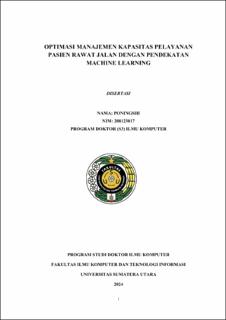Optimasi Manajemen Kapasitas Pelayanan Pasien Rawat Jalan dengan Pendekatan Machine Learning
Optimization of Outpatient Service Capacity Management Using A Machine Learning Approach

Date
2024Author
Poningsih, Poningsih
Advisor(s)
Sihombing, Poltak
Zarlis, Muhammad
Tulus
Metadata
Show full item recordAbstract
The main problem of this research is the maximum capacity that is not optimal
because not all outpatient requests are fulfilled, the limited range of appointment
times for returning patients and the average appointment lead time for old
patients due to emergency conditions so that new patients are unpredictable. The
study focuses on optimizing the previous model by restating the objective of this
system in terms of the risk of violation (ε). The prerequisites are the potential for
not being able to fulfill every request from a patient and not exceeding. The
model's goal is to determine the necessary minimal capacity for a particular
breach risk in order to achieve the intended lead time. This model fixes the
constraints of the prior model by determining the equivalent deterministic of
individual opportunity constraints, which will depend on what is known about the
probability distribution, and optimizes the management of outpatient requests that
are not all fulfilled, the limited range of appointment times for returning patients,
and the average appointment lead time for old patients. The test results show that
the probability value of the number of first visits (FV) patients arriving at time
unit i and being given an appointment at time unit j is greater than or equal to the
stochastic arrival of FV patients in time unit i is 0.51. Each test is different
because it involves generating random values from computer memory. The
probability value has increased from the previous model.
